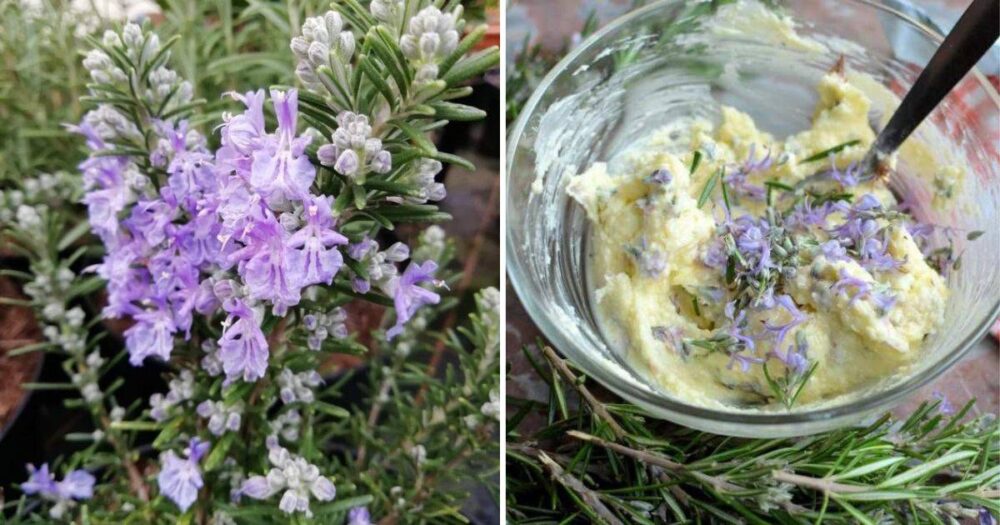Rosemary, the aromatic herb that’s a favorite in kitchens worldwide, isn’t just known for its flavorful leaves. Its dainty flowers are often overlooked, but pack a punch in both health and culinary applications. These blossoms come in shades of white, pink, purple, or blue, adding visual and aromatic appeal to gardens and dishes. So, let’s explore unassuming rosemary flowers and unearth the benefits they offer.

Health Benefits Of Rosemary Flowers
1. Antioxidant Powerhouse
Rosemary flowers, like the leaves, are rich in antioxidants, particularly rosmarinic acid and carnosic acid. These compounds help combat oxidative stress in the body, reducing the risk of chronic diseases and promoting overall health.
2. Immune Support
Rosemary flowers contain essential oils like eucalyptol, which have antimicrobial properties. That’s why consuming rosemary flowers can help strengthen your immune system and protect against common illnesses.

3. Digestive Aid
Rosemary flowers have been traditionally used to alleviate digestive issues. They can help with indigestion, bloating, and gas, making post-meal discomfort a thing of the past.
4. Mood Booster
The pleasant aroma of rosemary flowers is not just for show. Inhaling this fragrance can have a positive impact on your mood, reducing stress and promoting relaxation.
5. Anti-Inflammatory Effects
Compounds in rosemary flowers have anti-inflammatory properties. Regular consumption can potentially alleviate symptoms of inflammatory conditions like arthritis.

Creative Ways To Use Rosemary Flowers
Cuisine
1. Floral Garnish
If you want to add a visually striking and aromatic garnish, sprinkle fresh rosemary flowers over salads, soups, or main dishes. Their delicate appearance adds an elegant touch to your culinary creations.
See also The Amazing Benefits Of Basil Flowers That You Do Not Know About
2. Infused Oils And Vinegars
You can create your own infused oils and vinegars by adding rosemary flowers to them. This imparts a subtle floral flavor to your cooking. This rosemary-infused oil can be drizzled over fresh bread or used as a marinade.
3. Herbal Butter
Herbal butter with rosemary flowers is not only delicious but also delightful. Mix finely chopped rosemary flowers into softened butter along with a pinch of salt. This herb-infused butter is excellent for seasoning roasted vegetables or spreading on warm bread.

4. Honey Infusion
Rosemary flowers can be combined with honey and then infused for a few days. The result is a fragrant, sweet treat that’s perfect for drizzling over yogurt, cheese, or desserts.
5. Cocktail Elegance
Elevate your cocktails by using rosemary flowers as a decorative and aromatic garnish. They pair wonderfully with gin, vodka, and even non-alcoholic beverages like lemonade.
6. Tea Blend
If you’re looking for a soothing beverage, dry rosemary flowers and blend them with other herbs like mint or lavender to create a fragrant herbal tea. This drink is not only delicious but also offers various health benefits.

Home Decoration
1. Wreaths And Garlands
Fresh rosemary can be weaved into wreaths and garlands to decorate doors, windows, and mantels. The herb’s evergreen-like properties make it a go-to choice for holiday decorations.
2. Table Decor
Rosemary sprigs with flowers can be stunning table centerpieces or place settings, which can bring a rustic and aromatic touch to your eating area.
3. Accents For Gift Wrapping
Rosemary flowers can be a natural and pleasant accent for gift wrappings, making your present packages extra special.
See also 11 Houseplants That You Can Grow From Leaves
FAQS
1. Are Rosemary Flowers As Flavorful As The Leaves?
While rosemary flowers have a milder flavor compared to the leaves, they add a unique floral note to your dishes. They can be used in combination with the leaves for a more complex flavor profile.
2. Can Pets Eat Rosemary Flowers?
Rosemary flowers are edible and safe for pets to eat in small amounts, as long as they are not allergic to them. However, rosemary flowers also contain camphor, which can be toxic to pets if consumed in large quantities or in concentrated forms, such as essential oils. Camphor can cause vomiting, diarrhea, seizures, and even death in pets.

3. Are There Any Allergies Associated With Rosemary Flowers?
Some individuals may be allergic to rosemary, including its flowers. If you have allergies to plants in the Lamiaceae family, it’s best to use rosemary flowers cautiously.
It’s also crucial to consume it in moderation. Despite its positive qualities, excessive consumption of rosemary, including its flowers, can lead to unpleasant symptoms such as stomach discomfort, vomiting, irritation in the intestines, kidney damage, toxicity, and even coma.
4. Can I Use Rosemary Flowers In Dried Form?
Yes, you can dry rosemary flowers by hanging them upside down in a dry, well-ventilated area. Once dried, store them in an airtight container and use them in cooking or as herbal tea.
Rosemary flowers are a delightful addition to your garden and kitchen. They not only offer health benefits but also bring a touch of elegance and flavor to your culinary creations. So, if you have a rosemary pot right in your kitchen, let’s embrace the beauty and versatility of its flowers and let your senses bloom.
[ad_2]






